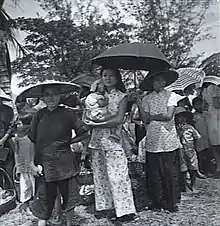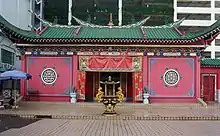Ethnic Chinese in Brunei
Ethnic Chinese in Brunei are people of full or partial Chinese – particularly Han Chinese – ancestry who are citizens or residents in Brunei. As of 2015, they constitute 10.1% of the country's population, making them the second largest ethnic group in Brunei. Brunei is home to one of the smaller communities of overseas Chinese.
Orang Cina di Brunei/اورڠ چينا د بروني 汶萊華人 | |
|---|---|
 Chinese women and children in Kuala Belait, 1945. | |
| Total population | |
| 42,100 10.1% of the Bruneian population (2015)[1] | |
| Languages | |
| English and Malay as medium of communication in schools and government • Mandarin (lingua franca) • Chinese dialects such as Hokkien, Cantonese, Teochew, Hainanese, Hakka | |
| Religion | |
| Buddhism • Christianity[2] • Taoism • Islam[3] • Chinese folk religion | |
| Related ethnic groups | |
| Singaporean Chinese · Malaysian Chinese · Overseas Chinese |

Ethnic Chinese in Brunei were encouraged to settle because of their commercial and business acumen. The biggest dialect group is the Hokkien; many originated from Kinmen and Xiamen in China. The Hakka and Cantonese represent a minority of the Chinese population. Despite their small numbers, the Hokkien have a considerable presence in Brunei's private and business sector, providing commercial and entrepreneurial expertise and often operating joint business ventures with Malaysian Chinese enterprises.[4]
History
During the Song Dynasty (960 AD to 1296 AD) trade was active between Poni (Brunei) and China. By the 17th century, Brunei had a Chinese community. However, trade declined in the 18th and 19th centuries. It was not until Brunei became a British protectorate that immigration increased again. In 1904, there were about 500 ethnic Chinese in Brunei, most of them British subjects. The discovery of oil in 1929 increased the population further. The Chinese population increased significantly during 1931–1947 when it quadrupled. Most of the immigrants arrived from Sarawak, Singapore and Hong Kong.
Statelessness
As of 1986, it was estimated that over 90% were unable to obtain Bruneian citizenship despite generations of residence in the country.[5] In the recent years, Chinese in Brunei are allowed to obtain Brunei Citizenship[6][7] although more serious reforms are blocked by the Home Ministry.[8]
Notable people
- Ong Sum Ping married Princess Ratna Dewi, the daughter of Sultan Muhammad Shah of Brunei. He was conferred the nobility title of Pengiran Maharaja Lela and elected Chief of Kinabatangan in the 14th Century.
- Goh Kiat Chun (Wu Chun), actor and singer.
- Roderick Yong Yin Fatt, former Secretary-General of the Association of Southeast Asian Nations.[9]
- Lim Jock Seng, former Second Minister of Foreign Affairs and Trade.
- Goh King Chin, former member of the Legislative Council of Brunei.
- Jaspar Yu Woon Chai, badminton player, Bruneian representative at the 2016 Summer Olympics.
- Lim Jock Hoi, current and 14th Secretary General of ASEAN.[10]
- Lau Ah Kok, owner of Hua Ho.
- Mohammad Amin Liew, current Brunei's Second Minister of Finance and Minister in Prime Minister Office.
- Cornelius Sim, current Apostolic Vicar of Brunei and first Cardinal of Brunei and Borneo
- Steven Chong Wan Oon, current Chief Justice of the Supreme Court of Brunei.
- Ong Tiong Oh, member of the Legislative Council of Brunei and Chairman of the Board of Directors at Chung Hwa Middle School.
See also
References
- "Population". 2015. Archived from the original on 20 March 2017. Retrieved 19 March 2017.CS1 maint: bot: original URL status unknown (link)
- "Brunei". state.gov.
- Islamic banking in Southeast Asia, By Mohamed Ariff, Institute of Southeast Asian Studies, pg. 24
- Richter, Frank-Jürgen, ed. (1999). "Overseas Chinese and Overseas Indian Business Networks". Business Networks in Asia: Promises, Doubts, and Perspectives. Greenwood. ISBN 9781567203028. Retrieved 2012-05-16.
- Limlingan, Victor Simpao (1986). The Overseas Chinese in ASEAN: Business Strategies and Management Practices. pp. 240–241.
- Hays, Jeffrey. "MINORITIES IN BRUNEI - Facts and Details". factsanddetails.com.
- "Stateless residents fight for sense of belonging in Brunei-World-chinadaily.com.cn". usa.chinadaily.com.cn.
- "Archived copy". Archived from the original on 2016-12-21. Retrieved 2016-09-19.CS1 maint: archived copy as title (link)
- "Archived copy". Archived from the original on 2016-03-08. Retrieved 2015-06-07.CS1 maint: archived copy as title (link)
- "Dato Lim Jock Hoi assumes office as new Secretary-General of ASEAN - ASEAN - ONE VISION ONE IDENTITY ONE COMMUNITY". 5 January 2018.